It’s time for some book reviews! Today’s roundup features the nonfiction books I read in the past month, with an impressive FIVE 5-star books in this list. We have books on parenting, on caring for our bodies and our minds, on coming to terms with our faith, and on loving others in big ways and small. Let’s dive in to these reviews!
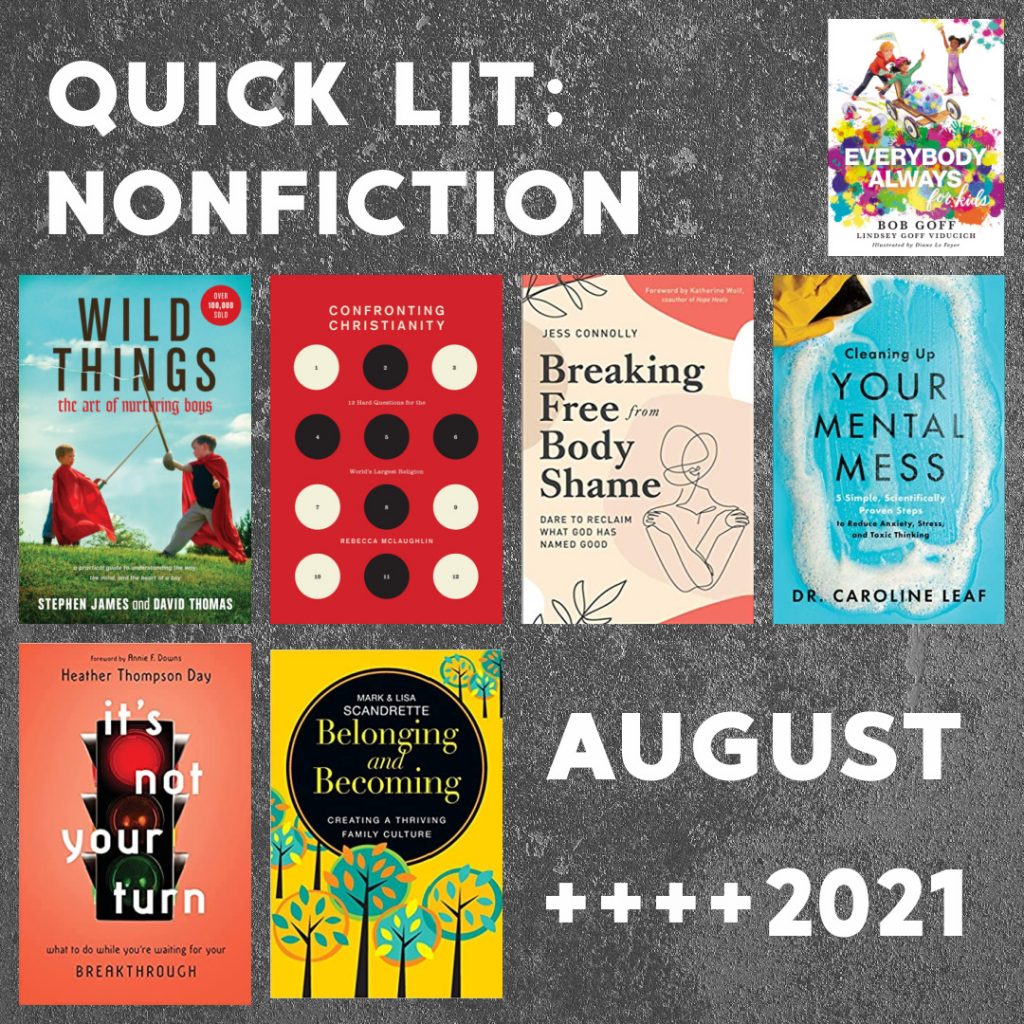
Breaking Free from Body Shame: Dare to Reclaim What God Has Named Good, by Jess Connelly: I’ve never met a woman who was completely confident in her body. Not one. And statistics bear this out: 98% of women say they wish they could change something about their bodies. The cultural conversations about these issues have shifted, with a contemporary focus on “health” and “positivity” rather than now-taboo topics of dieting and thinness, but we are still a society obsessed with appearance, and this quest for physical perfection remains impossible to shake for countless women, myself included. I have struggled with negative body image and disordered eating since my teenage years, and despite time in eating disorder treatment, copious amounts of therapy, and breakthroughs in nearly every other aspect of my spiritual and emotional life, this is an ongoing struggle for me. So I cannot overstate how much I needed this book.
Bible teacher Jess Connolly is also no stranger to body image struggles, having experienced disordered eating and body insecurity for most of her life. But over the last few years she has embarked on a journey to break free from broken beliefs about her body and embrace the truth: that her body was made by God, that God makes only good things, and that she can find restoration and freedom in embracing her physicality as God’s masterpiece. In Breaking Free from Body Shame, Jess helps readers identify the lies we have absorbed about our bodies, the reasons we have held onto these lies, and why such untruths are difficult to relinquish. She explains the inherent spirituality of this issue of body freedom and offers hope for reclaiming our bodies as the precious vessels they are, not projects that need to be fixed or trophies that need to be polished or perfected. She shows us how we are so much more than our appearance and how God wants to use us regardless of how many miles we can run or how many wrinkles we have, the straightness of our teeth or the size of our jeans.
This is a complicated issue (understatement!) and Jess handles it delicately, avoiding any possible triggers relating to diet talk, exercise goals, specific weight/size, or disordered behavior. (I’m hypersensitive to these triggers and was impressed by their total absence from the book.) She also addresses some common concerns related to the topic of embracing the goodness of our bodies, such as how to reconcile this with brokenness (sickness, disabilities, infertility, etc.) and how to care for our bodies without making idols of them. Her discussion of bodies is also refreshingly prescriptive-free. There is no plan here, no lists to follow or checklist items to cross off, no end goal we are looking to achieve. There is also no false positivity or shallow praise. Rather, the book tackles an admittedly difficult issue head on, using Scripture and stories from real women to help readers acknowledge and embrace the fact that our bodies are really and truly good and that God desires freedom for His daughters in this area.
I have a hard time imagining a woman who would not benefit from reading this book. For me personally, the book’s Kingdom mindset regarding our bodies was absolutely a breath of fresh air amidst a sea of confusing messages relating to this topic (from secular as well as well-meaning Christian teachers and sources). Though Jess’s powerful message could not disentangle me from a lifetime of body and food struggle, her words left a deep impression. Slowly, I am working to let the idea that “my body is good” move from my head to my heart as I ask God help me to embrace the freedom this book (and God’s own Word) has promised. I have hope that I might one day be able to step into a richer, more abundant life, unshackled from the bondages of body shame.
I have so much admiration and gratitude to Jess Connolly for her courage and passion in sharing this life-changing message. I love that she has brought the conversation to the forefront of conversation among Jesus’ followers and is helping to ignite a revival of unencumbered women; I value her ideas on how to break up with body shame for ourselves and how we can come alongside our sisters in doing so too. It’s a movement I want to be a part of.
My Rating: 5 Stars.
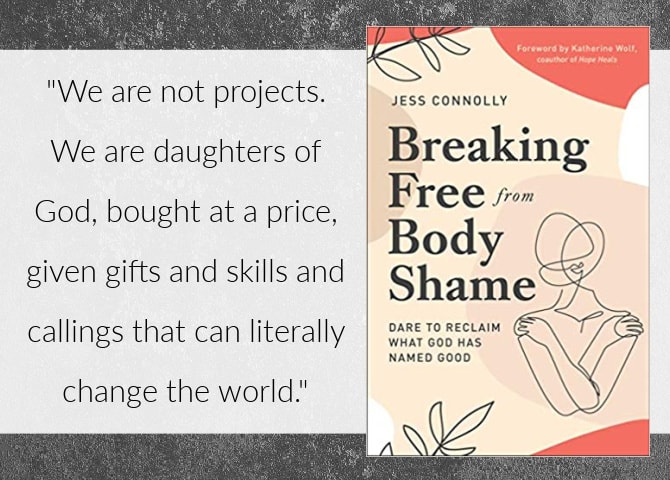
It’s Not Your Turn: What to Do While You’re Waiting for Your Breakthrough, by Heather Thompson Day: If you are a human living on planet earth, you’ve probably experienced the feelings of resentment and jealousy that come from seeing others achieve something you want while you continue to wait. Whether it’s a job, marriage, friendship, financial success, or simply recognition, it can be hard to celebrate the accomplishments and blessings of others while still waiting for our turn. In It’s Not Your Turn, Christian teacher and writer Heather Thompson Day helps readers navigate the tension of this middle place with a posture of humility and grace, making the most of this time in the waiting room while also working towards the fulfillment of long-awaited goals and dreams.
I picked up this book after hearing the author as a guest on the That Sounds Fun podcast, and I love her message. It’s one all of us relate to, and I appreciated her reminders of how God can work in and through us while we wait, developing our characters, strengthening our trust and intimacy with Him, and preparing us for work He would eventually have us do.
While the overarching premise of the books is fantastic, I struggled with a lot of the content, which fails to stick to a single topic. Much of the book is focused on self improvement and business strategy, which is contradictory to the central message of waiting. There is also quite a bit of political and social justice commentary, as well as critiques of the contemporary church, that would have been fine topics for another book but don’t really fit comfortably in this one.
Heather Thompson Day has a humorous writing style and her ideas are insightful and inspiring, intertwining her own story with Biblical examples, sociological studies, brain science, and the ideas from a spectrum of thought leaders. She is someone I would like to learn more from, but this particular book wasn’t quite what I was looking or hoping for.
My Rating: 3.5 Stars (Rounded down to 3 stars on Goodreads.)
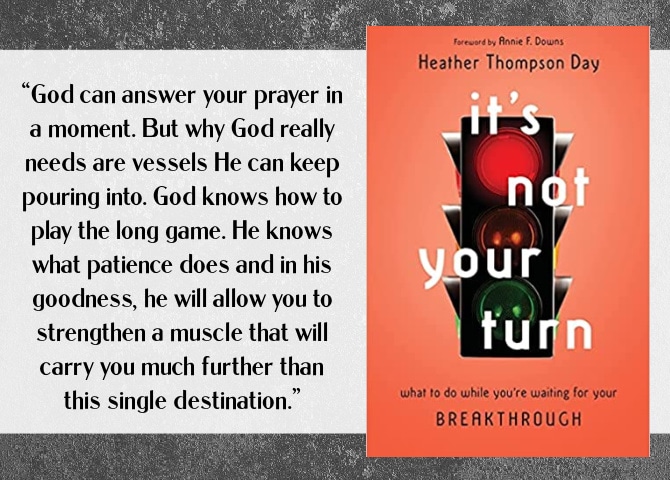
Everybody, Always for Kids, by Bob Goff and Lindsey Goff Viducich: Charleston and I immediately jumped into this book after wrapping up Love Does for Kids. Like its predecessor, Everybody, Always for Kids features Bob Goff’s whimsical storytelling alongside fun illustrations, with words and pictures working together to entertain kids and adults alike and inspire readers to love God and His people.
I like that this book includes some wild stories as well as more down-to-earth ones, giving us a great balance of aspirational loving acts alongside practical ways we can begin loving others right now. Every story is built on solid Biblical truths, helping Charleston understand how the concepts he is learning from the Bible are relevant for him today. I’m sure this is a book our family will come back to again and again.
My Rating: 5 Stars.
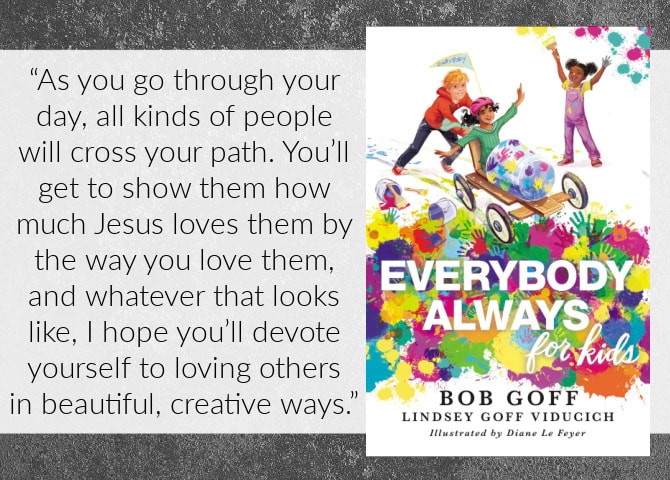
Wild Things: The Art of Nurturing Boys, by Stephen James and David Thomas: If you have spent any amount of time around young children of either sex, you know that boys and girls are different. VERY different. As a mother raising two sons, it can be difficult for me (in my innate womanhood) to understand my sons’ “boyness”, or know how exactly how to relate to them (or get them to relate to or respond to me). Enter this book, in which Christian therapists and child experts Stephen James and David Thomas offer insight, advice, and encouragement for parents of boys.
I have read numerous parenting books over the past several years, some more helpful than others; this one lands squarely at the top of my list of favorites. The book is practical, actionable, informative, and inspiring, communicating the information of a richly-sourced textbook through engaging and memorable writing. The book takes a story-based approach, playing off of themes from the picture book Where the Wild Things Are, and incorporating stories from other popular books and films (in addition to real-life stories of the authors’ patients and their own sons), to explore the developmental stages of boys, the intricacies of their hearts and minds, and their various physical, spiritual, and emotional needs.
The book is broken into four helpful sections. In the first part we get a deep-dive into the “way of the boy” with explanations of each stage (from birth through adulthood) of a boy’s development. These chapters help parents know what to expect in each stage, identifying specific needs and expectations of boys at each age and offering tips to maximize healthy development at every age. Part Two looks at the brain, learning styles, and gender-specific cognitive struggles of boys and how they can be addressed. Part Three examines boys’ hearts and helps parents understand how to nurture boys’ emotions and spiritual maturity, offering mother- and father-specific advice. Finally, in the book’s final section, the authors bravely dig into some hot topics such as discipline, sexual issues, screen time, and abuse as the topics relate specifically to boys.
I truly loved everything about this book that helped me understand Charleston (and future Sully) more thoroughly than ever before. The book answered several of my questions regarding what I thought might be developmental problems or delays (turns out they’re totally normal!) and helped me know what to expect for my boys’ future and how to be the best parent I can be for them. (Yes the sections on adolescence were terrifying, but it’s better to be prepared than enter blindly!) The book opened my eyes to how very different boys and girls can be and helped me see how I will need to parent my sons differently from my daughter. I am thankful to my therapist for pointing me to this book and will be recommending it to all of my Boy Mom friends
My Rating: 5 Stars.
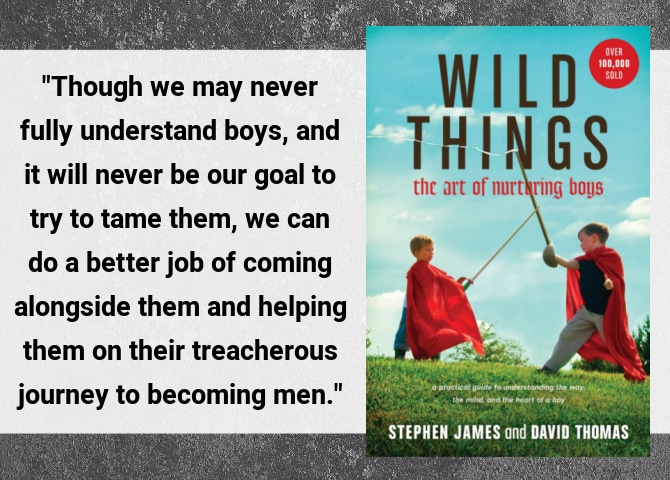
Cleaning Up Your Mental Mess: 5 Simple, Scientifically Proven Steps to Reduce Anxiety, Stress, and Toxic Thinking, by Caroline Leaf: I think it’s safe to say that we are all plagued by mental mess; these days it’s difficult to identify a single person who is free of anxiety, depression, or overwhelm. Many of us turn to counseling, medication, or even destructive behaviors to handle (or avoid) our mental messes, but neuroscientist Caroline Leaf argues that we can clean up these messes more effectively through a simple 5-step process. Dr. Leaf builds on our understanding of neuroplasticity and habit formation to show how the five steps of the neurocycle (Gather, Reflect, Write, Recheck, Active Research) can break habits, detox trauma, help us learn, and bring clarity and stability to our daily activities and routines.
I’ve heard Dr. Leaf share her science on a handful of podcasts and was intrigued by her approach, but this book was a disappointment. More than half the book is dedicated to explaining the problem of mental mess and the reasons for adopting the neurocycle process; though important information, I did not need such in-depth analysis of the problem when I was already on board with hearing her ideas for a solution. A very small portion of the book explains the actual 5 steps and I found these explanatory chapters wildly inaccessible and unhelpful. I was also frustrated by trite testimonials scattered throughout each chapter and the numerous references to her other books and apps.
On a more significant note, I am uncomfortable with Dr. Leaf’s dismissal of professional help (counseling and particularly medication); the self-help strategies she is suggesting are effective, but they will not be enough for those suffering from clinical levels of anxiety, depression, or trauma. (Speaking from experience: in my lowest of lows there is no way I could have applied these strategies without help.)
Mental examination and processing are excellent tools for achieving brain health, and even prior to reading this book, I have benefitted from implementing many of Dr. Leaf’s strategies thanks to years of training via therapy and personal study. If you are totally new to these ideas you might find this book beneficial, but if you are familiar with the concepts of cognitive restructuring through self-talk, examination, and journaling, you already know most of what this book has to teach.
My Rating: 3 Stars.
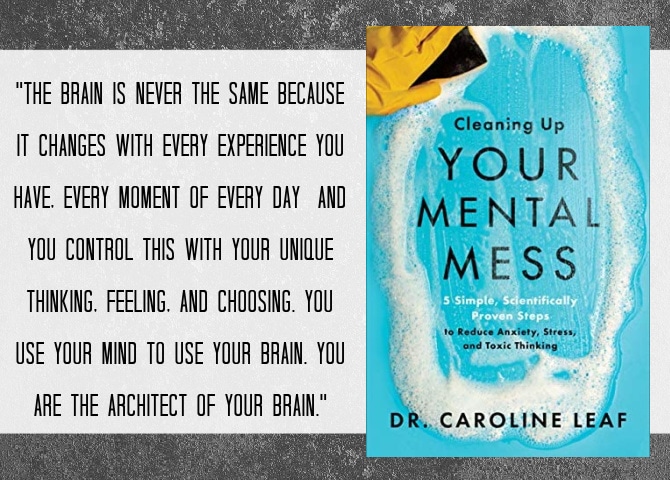
Confronting Christianity: 12 Hard Questions for the World’s Largest Religion, by Rebecca McLaughlin: Christianity is nothing if not controversial, and as we move into a largely post-Christian era, more and more people are asking questions and presenting concerns regarding what they see as roadblocks to “buying in” to the faith. In Confronting Christianity, theologian Rebecca McLaughlin presents helpful answers to twelve of the most common hangups people may have with Christianity. McLaughlin does not shy away from the difficult issues, tackling everything from the problem of suffering, the authenticity of the Bible, and the existence of Heaven and Hell, to the Bible’s stances on homosexuality, slavery, feminism, and justice. McLaughlin relies heavily on Scripture while also drawing from the sciences (sociology, psychology, archaeological findings and more) to paint an accurate portrayal of Christianity that is not at all what is often assumed by outsiders peeking in on the Christian faith.
This is one of the most comprehensive and relevant books I have read on this subject. The writing style is intelligent and compelling, and the content is wide-ranging. I admire McLaughlin’s refusal to take the easy way out with this book: she tackles some incredibly tough issues but does so with remarkable humility and grace while remaining firmly committed to what she believes to be true. Some chapters explore aspects of Christianity I’m quite familiar with and that have been addressed by theologians for many generations, but other chapters address more of-the-moment topics such as social justice issues and the nature of morality.
McLaughlin offers quite a few “hot takes,” but the most enlightening are her thoughts on homosexuality. McLaughlin is a woman who experiences same-sex attraction but is happily married to a man, and from this vantage point she is able to provide a unique perspective and insights into the reasons for the Bible’s stance on this issue, as well as some truly shocking statistics related to same-sex attraction and some mind-blowing ideas on intimacy, gender, and marriage.
If you are intrigued by Christianity but are having a hard time accepting aspects of the faith, or if you are a believer looking for helpful ways to respond to the skepticism of those around you, this book is absolutely for you. There is no shaming or defensiveness here, just kind-hearted guidance in identifying and embracing the love, hope, and truth that Christianity has to offer. I’ve already recommended this book to numerous friends and will continue to press it into people’s hands.
My Rating: 5 Stars.
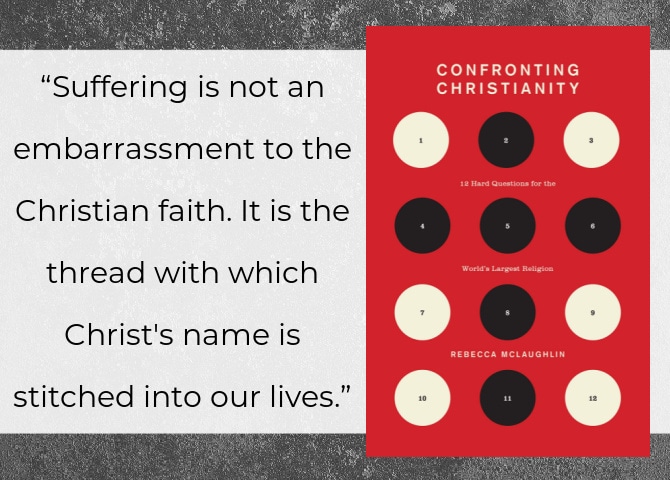
Belonging and Becoming: Creating a Thriving Family Culture, by Mark and Linda Scandrette: For many of us, raising children is the most important thing we will ever do. But how much thought and intentionality goes into creating the home life we desire for our children and ourselves? If you’re like me, it’s not as much as it could be. In Belonging and Becoming, Christian teachers Mark and Lisa Scandrette guide parents in establishing a thriving family culture in which each family member “feels safe, cared for and loved, and is supported to develop who they are for the good of the world.” The Scandrettes define a thriving family as a family who 1) lives from a vision; 2) carries out its purpose; 3) finds a rhythm; 4) discovers a common story; 5) fosters connection; 6) celebrates abundance; 7) nurtures growth; and 8) supports productivity. The Scandrettes share transparently about how they accomplished these goals in their family of five, and they offer tools for readers to begin crafting and implementing a similar culture. Throughout the book we read stories of other thriving families, as well as reflections from the Scandrettes’ daughter, now a young adult, about the benefits she gleaned from growing up in an intentional home.
I have never read a book quite like this one—a book that joins spiritual practices and attitudes with more practical parenting ideas, with a long-term goal of healthy family in mind—and I found it incredibly enlightening and useful. The format is engaging and easy to follow and adopt, with each chapter including three tools (reflection points, family meeting topics, and family activities), as well as a helpful recap of each chapter’s key learning component. This makes the content memorable and applicable for parents as well as their children.
I appreciated that the Scandrettes share what worked for them without suggesting all thriving families must look like theirs. Instead, they help parents and their children work together to determine a culture that is reflective of the family’s unique needs, goals, strengths, and values. I also really love that the book is not just geared towards helping children OR parents thrive, but that the book emphasizes “thriving” as a communal act and one each family member (even littles) can participate in.
I would like to reread this with Luke so that we can work together and with our kids to craft our own family culture. The book contains a helpful group learning guide that would make this ideal for working through alongside other families, something I am also interested in doing with our couples’ small group. Whether your children are young adults or not yet born, if you have found yourself floundering in identifying what you want for your family life, I encourage you to pick up this book ASAP.
My Rating: 5 Stars.
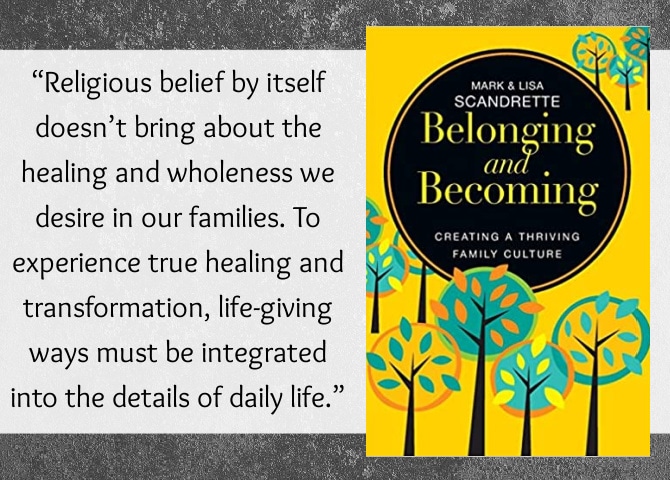
I’ll have the fiction segment of this month’s book reviews for you next week. Until then, happy reading!
Wow so many 5 star reads! 🙌😍